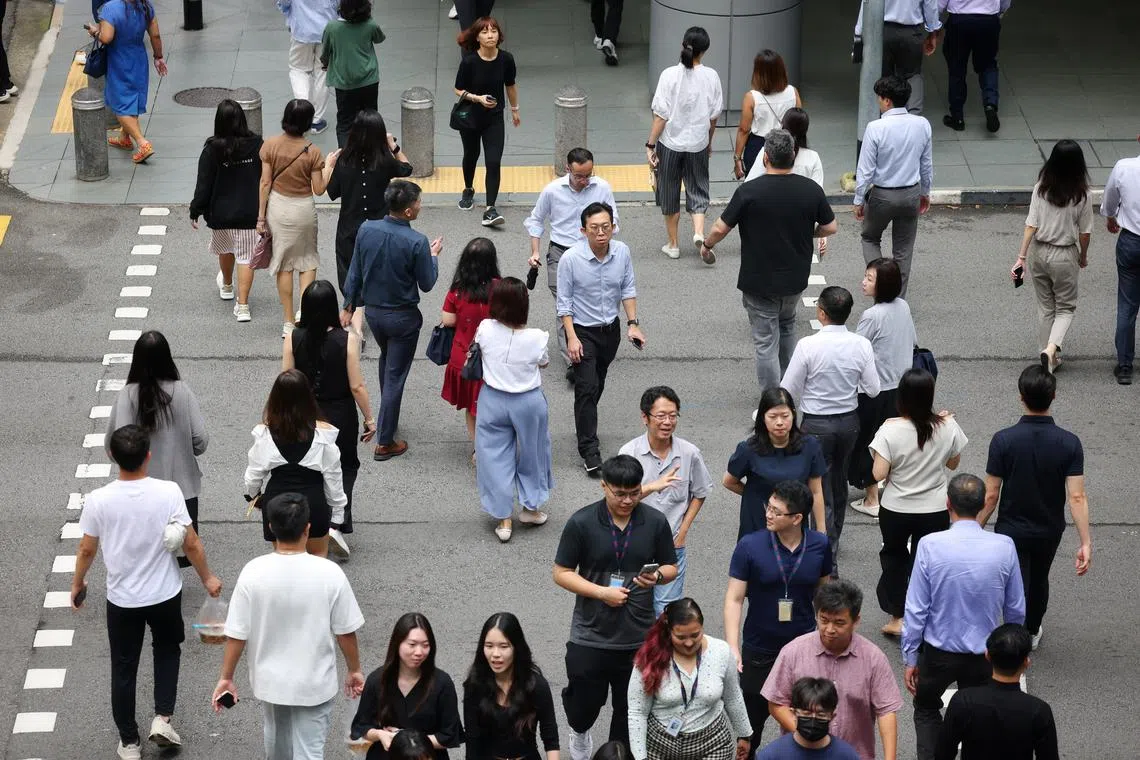Real wages in Singapore up 3.2% in 2024 but fewer firms planning increment this year: MOM
Sign up now: Get tips on how to grow your career and money

Real wages grew 3.2 per cent in 2024, up from 0.4 per cent in 2023 as inflation eased, said MOM.
ST PHOTO: JASON QUAH
SINGAPORE - Real wage growth in Singapore picked up in 2024 as inflation eased, but could slow down in 2025 due to ongoing geopolitical tensions and global trade uncertainties, said the Ministry of Manpower (MOM).
Nominal total wages grew by 5.6 per cent in 2024, up from 5.2 per cent in 2023, on the back of continued economic growth.
After accounting for inflation, which eased from 2023, real wages grew by 3.2 per cent in 2024, up from 0.4 per cent in 2023, MOM said in its annual wage practices report released on May 28.
But MOM’s forward-looking survey, conducted in the first quarter of 2025, showed a decline in the share of firms planning pay increments. The proportion of firms intending to do so dropped to 22 per cent in March 2025, from 32 per cent in December 2024.
“These trends point to a potential moderation in nominal wage growth in 2025 compared with in 2024, especially in trade-reliant sectors such as manufacturing and wholesale trade,” MOM said.
In 2024, rank-and-file workers and junior management employees saw higher wage growth at 5.8 per cent and 5.6 per cent, respectively, compared with senior management at 5.1 per cent. Most firms that offered a higher pay rise to lower-income employees said they did so to help them cope with the higher cost of living.
“Policy factors such as increases in the local qualifying salary and the implementation of Progressive Wage Model initiatives have also contributed to higher wage increases among lower-income employees,” the ministry said.
The local qualifying salary – referring to the minimum amount that local employees must be paid by firms that hire foreign workers – has been increased to $1,600 a month since July 1, 2024, from $1,400 a month previously.
MOM polled some 6,160 firms from the private sector with at least 10 employees for this report. The findings reflect the wages of more than 587,000 Singaporeans and permanent residents who have been full-time employees for at least one year.
In 2024, eight in 10 business establishments were profitable – just slightly down from 82.1 per cent in 2023.
The manufacturing sector saw an increase in profitable firms, while real estate services, construction and wholesale trade did not fare as well.
The ministry noted that while more firms had raised their employees’ salaries in 2024, they did so to reward past organisational performance, rather than to signal forward-looking confidence.
Only 3.2 per cent of the firms surveyed cut wages in 2024, down from 6.5 per cent in 2023.
MOM said there is continued demand for skilled workers in financial services and community, social and personal services.
Administrative and support services reported the highest wage growth at 8.7 per cent in 2024, largely due to the Progressive Wage Model. This was followed by financial services at 6.7 per cent, and community, social and personal services at 5.7 per cent.
But wage growth in the manufacturing and wholesale trade industries was below average, coming in at 5.1 per cent and 4.2 per cent, respectively, due to ongoing geopolitical and trade tensions. These two sectors are expected to further moderate in the coming year.
Meanwhile, 76 per cent of firms adopted some form of flexible wage system (FWS), said MOM. This means they have included either a monthly variable component or an annual variable component in the pay package.
But the share of firms that have fully adopted the flexible wage system remained low, at 8.5 per cent.
Firms that had adopted at least one FWS component reported higher wage growth than those that had not, since they could adjust the variable components to offer bonuses to employees during periods of good economic growth, MOM said.
Separately, the Singapore Business Federation (SBF) also noted the weakened business outlook in the first quarter of 2025
The bearish sentiment is shared by both small and medium-sized enterprises and large companies, said SBF, which shared its findings from the National Business Survey on May 28.
The survey polled 526 businesses across all major sectors from March 27 to April 21.
SBF’s overall Business Sentiment Index (BSI), a new indicator capturing business confidence, stood at 56.5, reflecting a generally cautious sentiment among businesses.
While the banking and insurance and education sectors showed a more optimistic sentiment, with BSI scores of 61.2 and 60.5, respectively, the hotels, restaurants and accommodations sector remains more cautious at 52.2, with lower revenue expectations.
“We hope to work with the Government and financial institutions to better support our businesses, which may now require larger financing lines and longer financing terms to deal with the impact of US tariff measures,” said SBF chief executive Kok Ping Soon.


